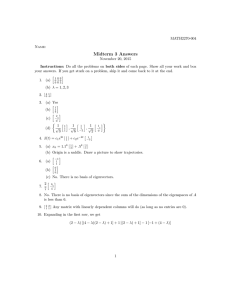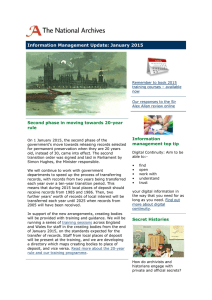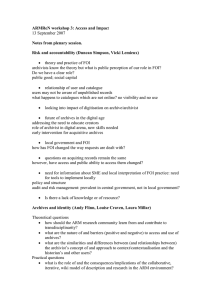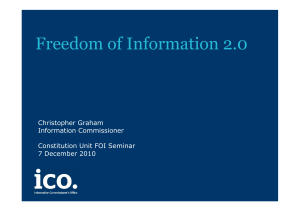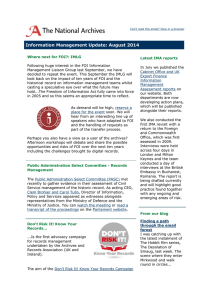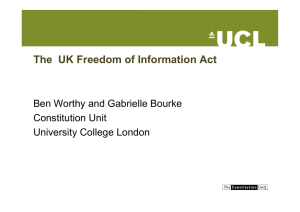Session 3: Open access, Empty archives? A word of warning In August 2004 I organised an international symposium in London on Contemporary History, Public Records, and Freedom of Information, in my capacity as director of the Institute of
advertisement
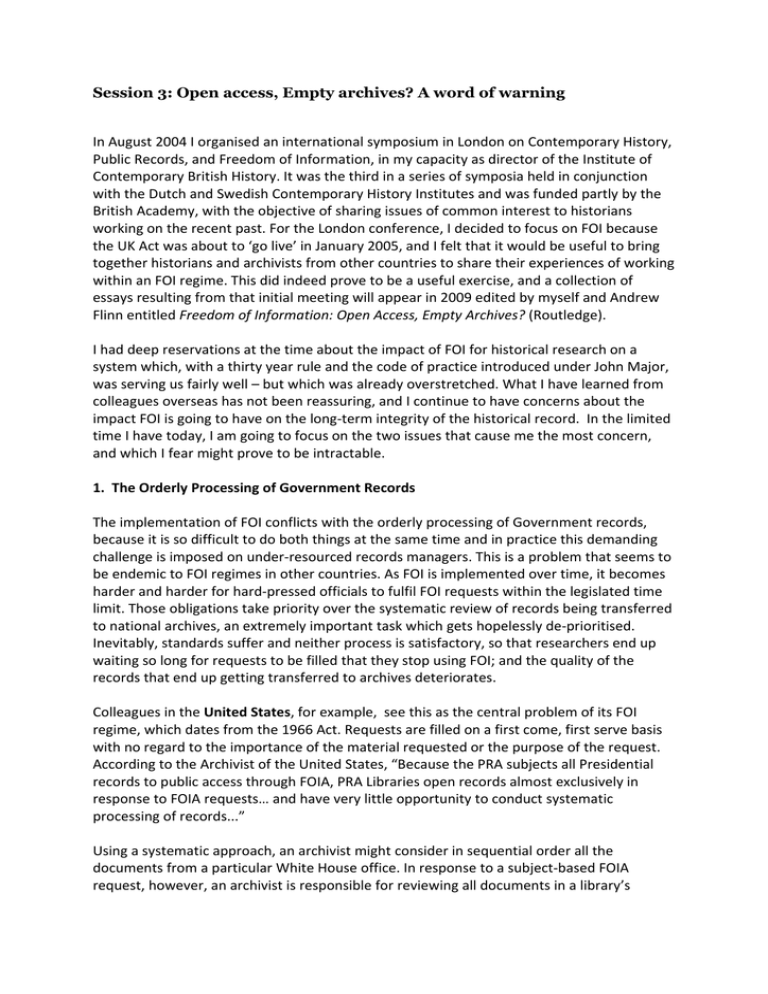
Session 3: Open access, Empty archives? A word of warning In August 2004 I organised an international symposium in London on Contemporary History, Public Records, and Freedom of Information, in my capacity as director of the Institute of Contemporary British History. It was the third in a series of symposia held in conjunction with the Dutch and Swedish Contemporary History Institutes and was funded partly by the British Academy, with the objective of sharing issues of common interest to historians working on the recent past. For the London conference, I decided to focus on FOI because the UK Act was about to ‘go live’ in January 2005, and I felt that it would be useful to bring together historians and archivists from other countries to share their experiences of working within an FOI regime. This did indeed prove to be a useful exercise, and a collection of essays resulting from that initial meeting will appear in 2009 edited by myself and Andrew Flinn entitled Freedom of Information: Open Access, Empty Archives? (Routledge). I had deep reservations at the time about the impact of FOI for historical research on a system which, with a thirty year rule and the code of practice introduced under John Major, was serving us fairly well – but which was already overstretched. What I have learned from colleagues overseas has not been reassuring, and I continue to have concerns about the impact FOI is going to have on the long‐term integrity of the historical record. In the limited time I have today, I am going to focus on the two issues that cause me the most concern, and which I fear might prove to be intractable. 1. The Orderly Processing of Government Records The implementation of FOI conflicts with the orderly processing of Government records, because it is so difficult to do both things at the same time and in practice this demanding challenge is imposed on under‐resourced records managers. This is a problem that seems to be endemic to FOI regimes in other countries. As FOI is implemented over time, it becomes harder and harder for hard‐pressed officials to fulfil FOI requests within the legislated time limit. Those obligations take priority over the systematic review of records being transferred to national archives, an extremely important task which gets hopelessly de‐prioritised. Inevitably, standards suffer and neither process is satisfactory, so that researchers end up waiting so long for requests to be filled that they stop using FOI; and the quality of the records that end up getting transferred to archives deteriorates. Colleagues in the United States, for example, see this as the central problem of its FOI regime, which dates from the 1966 Act. Requests are filled on a first come, first serve basis with no regard to the importance of the material requested or the purpose of the request. According to the Archivist of the United States, “Because the PRA subjects all Presidential records to public access through FOIA, PRA Libraries open records almost exclusively in response to FOIA requests… and have very little opportunity to conduct systematic processing of records...” Using a systematic approach, an archivist might consider in sequential order all the documents from a particular White House office. In response to a subject‐based FOIA request, however, an archivist is responsible for reviewing all documents in a library’s collection in order to locate a limited number of documents relevant to the subject of the FOIA request. While such an approach may satisfy those who submit the requests, they do not secure the larger objective of clearing for public access significant portions of the presidential record. Additionally, because FOIA requests must be responded to in the order in which they were submitted, the archivists have no discretion in moving to the front of the processing line those requests that are likely to yield materials with the greatest historical or political significance. Thus, an early FOIA request regarding governmental information on UFOs would be privileged in the process over a later request on a subject of broader interest. In fact, many FOIA requests are confined to inquiries related to documents concerning a single individual. It is expensive and time consuming, and has a cumulative effect which many researchers have concluded has limited access rather than opened it up. Libraries operating under the rules of the PRA typically have a waiting period for processing FOIA requests of 3‐5 years. In such circumstances information is “free” in theory, but closed in fact. FOI has created a system in the US that is poorly equipped to process, the mass of documents produced by each administration, and critics argue that there would be greater access sooner if archivists were able to work through records systematically without the burden that FOI imposes. Similarly, researchers in Canada seeking historical records under the terms of the 1983 Access to Information Act report bureaucratic delays of 18 months or more. The Canadian legislation operates a thirty day response rule, but just four years after implementation, there were significant problems. Resource hungry officials are so busy trying to fill FOI requests that work on the systematic review of historical records has in many departments come to a standstill. Frustrations with the access to information process have led some established Canadian historians to give up on the Access Act altogether. Robert Bothwell and Patricia McMahon, for example, both believe that the Act should be revoked in favour of a twenty‐five year rule. 2. ‘Empty Archive’ Syndrome An even more worrying aspect of FOI is its long‐term impact on the historical record. Sweden’s FOI regime is the oldest in the world and dates back to 1766. The Swedes take great pride in this and Swedish national identity is based on a self‐perception which includes FOI as a potent embodiment of the rational liberalism that supposedly characterises its political culture. The Swedes have been critical of the ‘closed’ information culture in EU institutions and have been proactive in urging the EU and its member states to adopt FOI regimes. But as FOI has evolved in Sweden over the past two and a half centuries, so has a culture of information evasion. There is overwhelming evidence to suggest that instead of increasing access, FOI has fatally compromised public scrutiny of government policy and the integrity of Sweden’s public archives. 250 years of FOI in Sweden has resulted in the development of an oral culture of decision making that leaves no trace in the official records. Correspondence that does exist tends to be formal and prepared with FOI in mind. The former head of the Swedish National Audit Office, Inga‐Britt Ahlenius (currently head of the Office of Internal Oversight Services at the United Nations), speaks of ‘the Myth of Our Openness.’ In her words: ‘What we know and have seen up to now mainly points to the fact that the Swedish freedom of information principle if anything leads to fewer opportunities for scrutiny... most of what is of the greatest interest is not written down and hence not available...’ i Ahlenius has written of her experiences on the team that was asked to audit the EU Commission on the instructions of the European Parliament, which she describes as a real ‘eye‐opener’ because of the kinds of information made available for scrutiny, information that simply does not exist, even in exempt files, in Sweden: ‘The Commission relaxed the embargo on freedom of access to documents and we were supplied with boxes of large steel‐reinforced files. Using them we were able to track the major programmes that we were auditing since the files contained EVERYTHING. Everything was documented – besides more formal records there were notes of telephone conversations, notes of internal meetings, deliberations, discussions, EVERYTHING. From these records it was not difficult to follow a matter from beginning to end, including errors and irregularities of various kinds – and in this way the ‘closed’ Commission itself supplied all the material that made it possible for us to submit a report that led to its immediate fall. I have amused myself by asking a number of [Swedish] senior corporate managers whether they have ever written to the government on a matter that was important to them. The answer was no – important issues are discussed orally, by telephone or in some other way.’ Swedish historians thus speak of an ‘empty archive’ syndrome caused by FOI. Files are over‐ weeded and many of the kinds of records that we would expect to see at TNA simply do not exist in Sweden, either because they were never generated in the first place, or because they are not retained. When I first began to discuss the Swedish FOI regime with colleagues in Stockholm, there was one piece of information that I assumed I had misunderstood or had been lost in translation, but I can assure you that the following fact is true: after a quarter of a millennium of FOI in Sweden, no minutes are taken at Cabinet meetings. Conclusions I’m not going to predict that the UK’s FOI regime in ten years’ time is going to have impossibly long wait times, or that the Cabinet Secretary is going to stop keeping notebooks. But I think we need to be vigilant and we need to be proactive. It is important to remember that archivists are on the side of the historians, and that there are many examples of archivists and historians working together to make the system more effective. In the US, I know of instances where Presidential Library archivists have assisted researchers in making broad and intelligent requests so that when the FOIA submission comes to the front of the queue they are able to focus on reviewing a section of the record that merits attention. In Holland, there are examples of archivists and historians working jointly through the judicial system to make FOI more liberal in practice. The advice we received from our colleagues at the 1994 London conference was clear: in order for FOI to be compatible with the preservation of the historical record, it is essential for British historians and archivists to work together so that problems are identified and jointly lobbied on. The UK system has an institutional framework to accommodate this to some extent, but the professions have a duty and a responsibility to encourage that process. Empty Archive syndrome is another matter, however. It is not only the development of an oral culture of decision‐making that is disturbing; it is the rapid development of information technology that facilitates and accelerates the development of a decision‐making culture that isn’t written down that bothers me. In Sweden, where the modern state evolved after a right to information had been introduced, record keeping simply failed to develop the way it did in more closed information regimes, which only goes to show that you can’t legislate against human nature. One of the positive consequences of a closed regime for British historians has been that the historical record here is relatively rich and the archives rewarding to work in. FOI in the UK, combined with the impact of new technology, is underlining the critical importance of oral history, and the development of rigorous methodologies to ensure that interview techniques are professionally transcribed and archived. This is a growing aspect of the work of the contemporary historian, the capturing and depositing of oral testimony from officials and decision‐makers, so that generations of historians in the future are not faced with empty archives.

